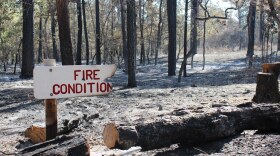From Texas Standard:
Nearly 10 years ago, destructive wildfires forced mass evacuations and destroyed thousands of homes near Austin. Today, the city’s soaring growth is raising concern that Austin remains ill-prepared for a wildfire outbreak. California firefighters recently visited the capital city to educate community and city leaders on what they need to do to prepare for and prevent destructive wildfires.
On a sunny and windy day last week, about 40 people crowded the top of a scenic Hill Country overlook in Austin. But they weren’t there for the view. This group of city and state leaders listened as firefighters from California and Austin pointed out the cedar trees and brush climbing up the incline. They also noted the strong winds funneling up to the overlook. Despite this spot’s great views, it’s a fire hazard. A potential wildfire could quickly travel up this slope through the trees and brush, threatening dozens of nearby homes.
“I look at the continuous fuel that goes right up to the houses and I’m like, uh, in the conditions we’ve experienced, that is not good,” says Dave Russell, a California firefighter who helped coordinate responses to that state’s most recent “mega-fires,” including the Camp Fire in 2018. That fire destroyed the town of Paradise, California, and killed 85 people.
After going over the risks at the overlook, everyone climbs onto a charter bus. From there, the group travels to other densely populated neighborhoods near Lake Austin and Lake Travis.
“The first thing that stood out to me – and I’m from California – is there’s already traffic,” retired California firefighter Todd Derum told the group as they drove through some of these areas.
“So, if you cannot get people out of harm’s way in a timely fashion on the roadways, what are you going to do to protect them?” Derum asks.
Derum and Russell spent two days here, touring some of Austin’s most wildfire-prone areas. More than 60% of the city’s homes and businesses are located in the city’s wildlands, making that fire risk one of the highest in the nation.
Bob Nicks is president of the Austin Firefighters Association. He worries Austin’s rapid growth in the city’s risk areas, combined with climate change, will create a similar wildfire outbreak that happened around the Austin area nearly 10 years ago.
“When we have sustained winds coming out of the North or West at 30 mph for a couple of days, which is what we had during the 2011 fires, it’s going to be bad," Nicks says.
To address the risk, the California firefighters say Austin should keep investing in wildfire response training for its firefighters. They also advise homeowners here to “fireproof” their homes by doing things like keeping dry leaves out of gutters or reducing flammable brush in yards. In Colorado and California, officials have approved housing codes requiring residents there to fireproof their homes. In those states, builders must use flame-resistant construction materials. They also have to build homes a certain distance from each other. Bob Nicks with the Austin Firefighters Association wants Austin to do the same.
“There’s ways we can reduce our risk. But we all have to know it’s important, we all need to work together, we need to get on it,” Nicks says.
Austin City Council member Jimmy Flannigan’s district is largely located in a high wildfire risk area.
“It’s not a question of, ‘Do we now believe there is risk?’ and it’s not even a question of, ‘Now, do we think we should do something?’ It is, ‘What is the best thing to do?’” Flannigan says.
He also wants the city to approve some wildfire codes.
“At the end of the day we gotta figure what we can require and what we can enforce, and state law and the state Legislature doesn’t always let cities do all of the requirements and enforcements that we wish,” he says.
If Austin does adopt a set of wildfire codes, the city would be the first in Texas to do so.




